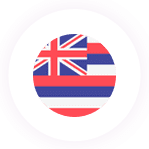The Hawaiian people have a rich history and culture for naming their “keikis” (babies). The Ancient Hawaiian people were centuries ahead of Freud who said that a person’s name was “perhaps a piece of his soul.” Long ago in Hawaiian culture, a person’s name – or in the Hawaiian language, the “inoa” – was considered just this, a possession that belonged to the person and a catalyst for either good or evil.
Naming children was not taken lightly in Old Hawaii, and many were involved in the process, from the child’s extended family to the influence of the gods. The “ancestor god” would reveal the name in some mystical way to a family member (either in a dream, in some spiritual voice, or through some other mystical sign). Ignoring the gods could bring great harm to the child, so it was considered non-negotiable to use this name demanded of the god and readily dispensed upon the child for mutual possession; that is, the child possesses the name but the name also possesses the child. The more the name was spoken, the more powerful it became. Further, the name became the property of the owner and could only be reused with permission of the possessor – to do otherwise would result in bad fortune or even death through this violation of the kapu (the Hawaiian kapu translates to “forbidden” or “taboo” in English – it was the ancient and sacred system of laws in Old Hawaii).
Most names in ancient Hawaii translate into lovely or powerful meanings suggesting good fortune, such as: The Beloved Child, The Chosen One, Conqueror of the Nation, Gatherer of Beautiful Things, The Rosy Glow of Dawn, The Mist, The Distant Ocean or the Peaceful Sea. Interesting to note; however, is that the ancient Hawaiians would occasionally use a repulsive or reviling name to trick an evil spirit believed to be attached to the child (causing illness for example). Surely, an evil spirit would stay away from a child with such a repugnant name! Similarly, loathsome names were sometimes used to make amends for a past insult to the gods. In both cases, once the need for such ugly names served their purpose, a favorable name could then be given to the child through ceremony to ensure their future happiness and good fortune.
Old Hawaiian naming traditions changed abruptly in the early nineteenth century as the Christian Missionaries forced their influence upon the Hawaiian people with complete disregard for their ancient customs. The system of the kapus was also abolished as the Christians believed it to be barbarian and sacrilegious to their own beliefs. Hawaiian names became quickly Christianized and generally reflective of Biblical sources. If Hawaiian families did honor their native customs by dispensing Hawaiian names, they generally did so in secret.
Today, Hawaiian names have persisted and regained popularity, not only by Hawaiian families, but also other peoples of Hawaii and non-natives stretching over to the mainland. The beautiful Hawaiian names, with their sounds alone, impart a sense of warmth and positive energy. They tell an ancient, pure and unadulterated story even in their simple meanings. It is a lovely notion that people, both native and non-native, perpetuate the rich ancient customs of Hawaii through naming their child. `O wai kou Hawaiian inoa? (What is your Hawaiian name?)




